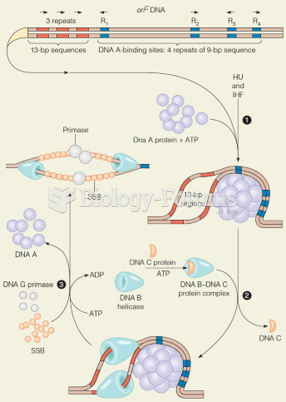This topic contains a solution. Click here to go to the answer
|
|
|
Did you know?
For high blood pressure (hypertension), a new class of drug, called a vasopeptidase blocker (inhibitor), has been developed. It decreases blood pressure by simultaneously dilating the peripheral arteries and increasing the body's loss of salt.
Did you know?
Common abbreviations that cause medication errors include U (unit), mg (milligram), QD (every day), SC (subcutaneous), TIW (three times per week), D/C (discharge or discontinue), HS (at bedtime or "hours of sleep"), cc (cubic centimeters), and AU (each ear).
Did you know?
The average office desk has 400 times more bacteria on it than a toilet.
Did you know?
More than 4.4billion prescriptions were dispensed within the United States in 2016.
Did you know?
Thyroid conditions may make getting pregnant impossible.







